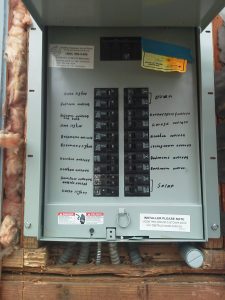
What does a main panel upgrade mean?
Your main electrical panel is designed to house a specific number of circuit breakers. This also means that all main panels have a certain capacity or amount of current that can flow through them. So, for example, some homes have a 100 amp panel, others 200 amps and so on. Having circuit breakers within the panel ensures only a specific amount of current flows through each keeping your appliances and home safe from overvoltage.
When the panel needs to be upgraded, the service will include a new main panel that fits your house needs, the materials required, and any permits relevant to the project.
When do you need a main panel upgrade?
Several conditions contribute to the need of a main panel upgrade and they include;
- Faulty writing
- Need to add a new appliance currently or in the future
- Changing old outdated wiring or electrical system
- Removing fuses and upgrading to circuit breakers
- For more power, safe and efficient system
What is involved with the main panel upgrade?
The electrician you have chosen or hired for the upgrade will provide an estimate of the cost after inspecting your home and determining your needs. Next, any issues with permits will be sorted out as the electrician who is licensed for the job has to be the one to pull the permits. You and your electrical technician will agree on a date for the upgrade after the permits have been pulled. The date is usually with consideration to clear weather. When it’s time for the upgrade and installation, the electrician will shut off the power to the entire home. Once the upgrade is finished either the homeowner or the electrical contractor will schedule an inspection.
Some electricians provide a warranty with the service.
Can I upgrade the main panel myself?
It might cross your mind seeing as most of the costs for the project are for labor but it’s not ideal to take on a panel upgrade. Only a professional electrician should handle a project like a panel upgrade because they are experienced in safety while working with electricity and also informed in recent standards and codes.
Not to mention that upgrading a main electrical panel yourself is illegal in some states. Investing in a professional service is the safe and most affordable option in the long run.
Tips to note when upgrading a main electrical panel
- Switches and outlets close to a water source must be protected by a ground fault circuit interrupter better known as GFCI. It helps to prevent shocks.
- Home electric dryers need a 30 amp outlet protected by a 30 amp circuit breaker. While home electric ovens require an 8 gauge wire with a 50 amp protected by a 50 amp circuit breaker.
- Outlets serving the kitchen and dining areas should generally be 20 amp circuits.

